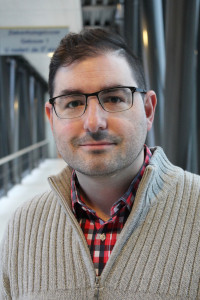Senior Researcher

Román González-Prieto moved forward to a new position as Emerging Group Leader at the Andalusian Center of Molecular Biology and Regenerative Medicine (CABIMER) in Sevilla, Spain. The he will continue his research about the role of Ubiqutin and Ubiquitin-Like E3 enzymes in Genome Biology.
For more information: www.cabimer.es
....
I am trained as an biologist, and my research career has provided me a very broad set of expertise that ranges from molecular biology, cell biology and biochemistry to fluid mechanics, chromatography and mass spectrometry-based proteomics and bio-informatics.
Every cell cycle, cells have to deal with DNA damage induced by both endogenous and exogenous sources. To overcome these damages in the DNA, cells bear a plethora of signaling pathways and repair mechanisms, namely, the DNA damage response, which function is very tightly regulated by different post-translational modifications. My research focuses on the study of the role of protein post translational modification by ubiquitin and ubiquitin-like modifiers in the regulation of the DNA damage response. Using mass spectrometry-based approaches, TULIP methodology enables me to identify ubiquitin ligase-specific targets, on which I perform subsequent functional analysis to determine the relevance that ubiquitin has in the regulation of these targets.
Furthermore, I am involved in many research collaborations in order to perform mass spectrometry analysis for different projects.
I studied biology at the University of Seville, Seville, Spain. Directly after finishing my studies I joined a spin-off company from the school of engineering, Ingeniatrics Tecnologías, where I worked for almost two years in the development of microfluidic-based applications for biology/biomedical sciences. Afterwards, I decided to make a turn in my career and joined the research group of Dr. Félix Prado in the Andalusian Center for Molecular Biology and Regenerative Medicine (CABIMER), Seville, Spain, where I did my PhD. studying the cell cycle-mediated control of the repair of replicative DNA lesions by the Homologous Recombination machinery. After my PhD, in 2013, I joined Alfred Vertegaal’s group to study SUMO signaling using mass-spectrometry approaches. In January 2018 I was awarded the KWF Young Investigator Grant by the Dutch Cancer Society, which enabled me to start my own independent research line at CCB.
http://orcid.org/0000-0001-8997-2321
Gonzalez-Prieto, R., Eifler-Olivi, K., Claessens, L.A., Willemstein, E., Xiao, Z., Talavera Ormeno, C.M.P., Ovaa, H., Ulrich, H.D., and Vertegaal, A.C.O.
Cell reports 2021, 34, 108691.
Salas-Lloret, D., Agabitini, G., and Gonzalez-Prieto, R.
Front Chem 2019; 7, 802.
Kumar, R.; Gonzalez-Prieto, R.; Xiao, Z.; Verlaan-de Vries, M.; Vertegaal, A. C. O.
Nat Commun 2017; 8, 1809.



Looking for information on one of our topics, a new place to conduct your research or experienced research to join forces with? Feel free to contact us.!